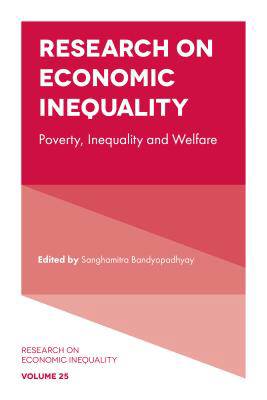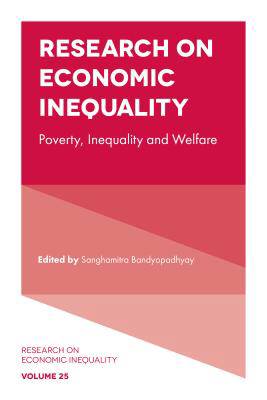
Je cadeautjes zeker op tijd in huis hebben voor de feestdagen? Kom langs in onze winkels en vind het perfecte geschenk!
- Afhalen na 1 uur in een winkel met voorraad
- Gratis thuislevering in België vanaf € 30
- Ruim aanbod met 7 miljoen producten
Je cadeautjes zeker op tijd in huis hebben voor de feestdagen? Kom langs in onze winkels en vind het perfecte geschenk!
- Afhalen na 1 uur in een winkel met voorraad
- Gratis thuislevering in België vanaf € 30
- Ruim aanbod met 7 miljoen producten
Zoeken
Research on Economic Inequality
Poverty, Inequality and Welfare
€ 248,45
+ 496 punten
Omschrijving
This volume contains research on how we measure poverty, inequality and welfare and how we use such measurements to devise policies to deliver social mobility. It contains ten papers, some of which were presented at the third meeting of The Theory and Empirics of Poverty, Inequality and Mobility at Queen Mary University of London, London, October 2016.
The volume begins with theoretical issues at the frontier of the literature. Three papers discuss the impact of social welfare policies on poverty measurement, and with innovations on the measurement of relative bipolarisation. Two papers address the conceptualisation of multidimensional poverty by incorporating inequality within the poor, and that of chronic poverty for time dependent analyses, with applications to India and Haiti, and Ethiopia respectively.
The second half of the volume consists of empirical contributions, using novel techniques and datasets to investigate the dynamics of poverty and welfare. These studies track the dynamics of poverty using unique datasets for China, the Caucasus and Italy.
The volume concludes with investigations about within-household inequalities between siblings due to the unequal effects of conditional cash transfers in Cambodia and a cross-country study on the effect of historical income inequality on entrepreneurship in developing countries.
The volume begins with theoretical issues at the frontier of the literature. Three papers discuss the impact of social welfare policies on poverty measurement, and with innovations on the measurement of relative bipolarisation. Two papers address the conceptualisation of multidimensional poverty by incorporating inequality within the poor, and that of chronic poverty for time dependent analyses, with applications to India and Haiti, and Ethiopia respectively.
The second half of the volume consists of empirical contributions, using novel techniques and datasets to investigate the dynamics of poverty and welfare. These studies track the dynamics of poverty using unique datasets for China, the Caucasus and Italy.
The volume concludes with investigations about within-household inequalities between siblings due to the unequal effects of conditional cash transfers in Cambodia and a cross-country study on the effect of historical income inequality on entrepreneurship in developing countries.
Specificaties
Betrokkenen
- Uitgeverij:
Inhoud
- Aantal bladzijden:
- 368
- Taal:
- Engels
- Reeks:
- Reeksnummer:
- nr. 25
Eigenschappen
- Productcode (EAN):
- 9781787145221
- Verschijningsdatum:
- 30/11/2017
- Uitvoering:
- Hardcover
- Formaat:
- Genaaid
- Afmetingen:
- 155 mm x 231 mm
- Gewicht:
- 680 g

Alleen bij Standaard Boekhandel
+ 496 punten op je klantenkaart van Standaard Boekhandel
Beoordelingen
We publiceren alleen reviews die voldoen aan de voorwaarden voor reviews. Bekijk onze voorwaarden voor reviews.








